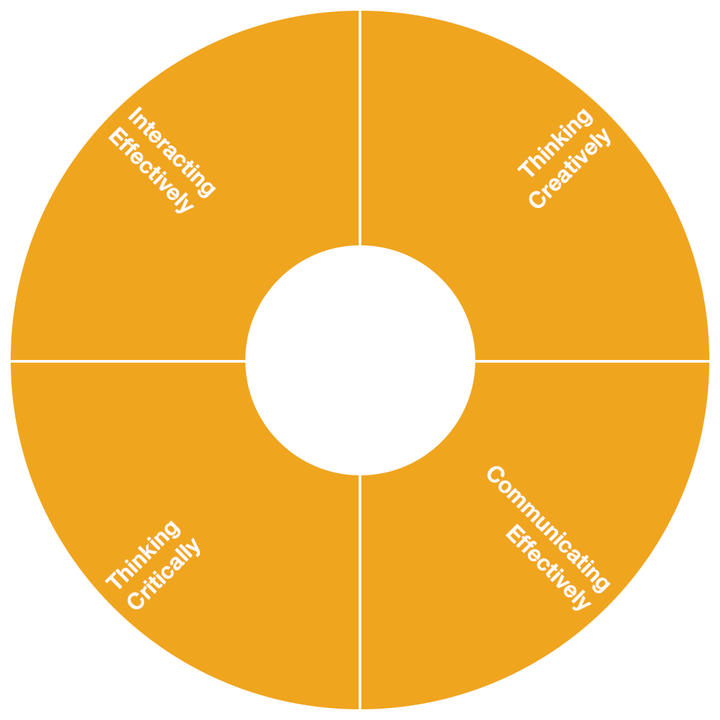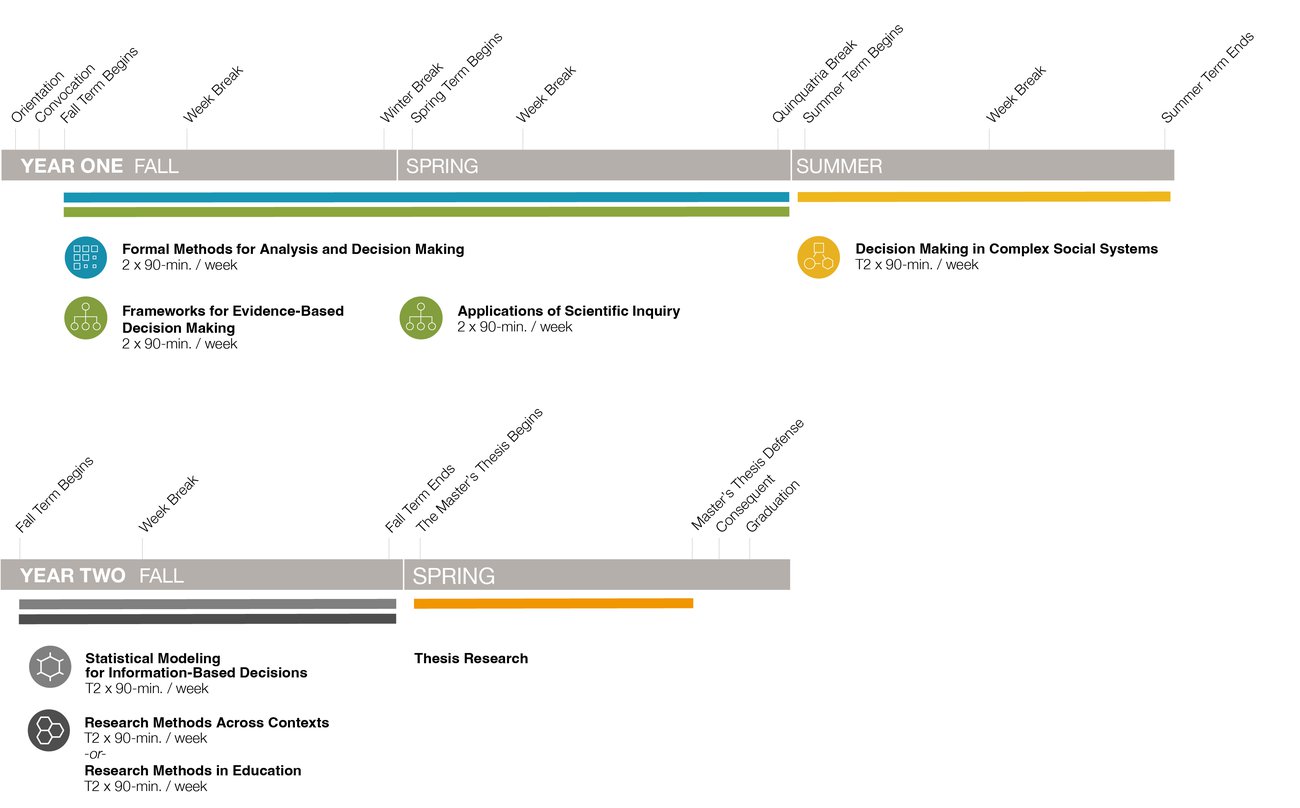A Curriculum For Decision Makers
The Master of Science in Decision Analysis online program prepares graduate students to analyze complex problems and make consequential decisions—those affecting teams, organizations, entire industries, and society at large.
The Master of Science in Decision Analysis program prepares graduate students to analyze complex problems and make consequential decisions—those affecting teams, organizations, entire industries, and society at large.
Your academics will focus on interpreting data and using available evidence to evaluate situations, develop viable options, and structure rational conclusions guided by an understanding of complex social systems. The program entails 16 months of virtual coursework, followed by five months of supported, remote independent study on an applied Master’s thesis project.
Course content focuses on addressing challenges in a variety of disciplines, from business to public policy to education to the computational and natural sciences. By applying a core set of research, analysis, and decision-making techniques to a range of issues, you hone your skills in multiple contexts, enabling you to transfer knowledge to new domains.
This cross-contextual application is central to your development of the Habits of Mind and Foundational Concepts (HCs) that contribute to success in any sector.
Your first three semesters focus on learning and practicing these HCs in six intensive semester-long, practical knowledge courses. The courses are designed to help you learn and utilize various research and analysis methods, characterize problems and potential solutions, understand and navigate complex social systems, and make data-informed decisions. In your fourth semester you will hone your skills and learn research methods applicable to your thesis through analytical focus courses. Your final semester is devoted to a four- to five-month applied thesis project on a relevant topic of your choosing, which could be related to your current professional employment if desired.
Under the guidance of your thesis advisor and an external expert, you will design and carry out an original thesis project that offers novel insights to address a problem of consequence or inform a substantial decision. To complete the program you will defend your thesis in front of two members of the Graduate School faculty, one of whom is your thesis advisor, and your external expert.
Completion of the degree grants 36 credits.
Curriculum Overview
Curriculum Overview

The six, semester long Practical Knowledge courses are structured to teach you to apply ~65 HCs across multiple disciplines. Throughout the curriculum, class material focuses on analyses of complex situations that support making decisions with broad impact. Class activities go into depth on a wide variety of cases and problem domains, helping you develop your creative thinking, critical thinking, and effective interaction skills. (24 units)

The Analytical Focus courses help you to further develop functional skills in data analysis and research design. Statistical Modeling for Information-Based Decisions addresses computational and information-based decision-making, using statistical inference. For the second course you can choose between Research Methods Across Contexts or Research Methods in Education. Both cover research methods, involving quantitative, qualitative, and mixed study design, as well as advanced data analysis. (8 units)
Formal Methods for Analysis and Decision Making
Learn how to represent situations systematically and logically, using concepts in mathematics, probability and statistics, computer science, and logic. The subject matter used to illustrate this material will typically be drawn from a wide range of pivotal real-world problems.
Decision Making in Complex Social Systems
Use tools and concepts from complexity theory to understand people and groups as complex systems. With this approach, we target the core competency of “effective interaction” with others, including analysis of case studies from a variety of global contexts that consider topics from leadership and negotiation to understanding yourself and your own goals.
Frameworks for Evidence-Based Decision Making
Learn to apply advanced problem solving skills and decision making frameworks to complex problems. Use data and evidence to define and characterize complex problems and generate viable solutions while analyzing and mitigating the effect of cognitive biases on the process of decision making.
Applications of Scientific Inquiry
Use the scientific method in interdisciplinary contexts to design research that tests innovative hypotheses and informs decision making. This class focuses on topics in the social and natural sciences that transcend disciplinary boundaries.
Research Methods Across Contexts
Practice how to design new research studies to collect the qualitative and quantitative data needed to support your decisions. Extend your use of the R language to develop effective data visualizations, descriptive statistics, and regression models. Apply your data analysis skills across contexts and hone your ability to analyze and present findings from both qualitative and quantitative data.
Research Methods in Education
Practice designing impactful studies that incorporate traditional educational research methods, transferable scientific methods, and rigorous analysis. Understand the relationship between the results of multiple types of testing, program evaluation, and classroom intervention methods and their real-world implications for educational practice and policy. Apply your data analysis skills to the education context and hone your ability to analyze and present findings from both qualitative and quantitative data.
Statistical Modeling for Information-Based Decisions
Learn how to extract meaning from data using modern approaches. Discover how to make big strategic decisions with mathematics, statistics, and computer simulation. Technical aspects of the course focus on computational approaches and real-world challenges, drawing cases from the life sciences, public policy and politics, education, and business.

“I chose Minerva because it’s interdisciplinary and has the practice and philosophy that can help me integrate all my ideas and experiences together. I love the idea of breaking down the boundaries between different disciplines because I feel like that’s the future. Minerva can help me understand how to learn and how to solve a problem instead of just teaching me the answer.”
Philip Chan, Class of 2022
VP & Global Head of HR, Appier

Master’s Thesis
To culminate the MDA program, your Master’s thesis will center on an issue of your choice, including one deriving from your current employment if desired. The project should include a review of relevant literature, an original argument and advanced analysis of the issue, demonstrating mastery of skills from your coursework through identification, analyzing, and presenting key decisions that must be made to address your topic. You will begin applying the skills you learn to your topic in your coursework through a series of applied assignments, with the last five months of the program dedicated to conducting any necessary research and completing your thesis under the tutelage of your thesis advisor and with feedback from an external expert. (4 units)
Stay Connected
Fill out the form to receive Minerva updates
For any questions, please contact us at masters@minerva.edu.
up next
up next

Minerva’s unique admissions process eliminates unfair biases and, instead, focuses on who you are, how you think, and what you have achieved.

To help you advance your career, Minerva will help you identify your goals, explore possible paths, and develop a realistic plan to achieve them.

The Master of Science in Decision Analysis is both affordable and can be financed with optional student loans.














